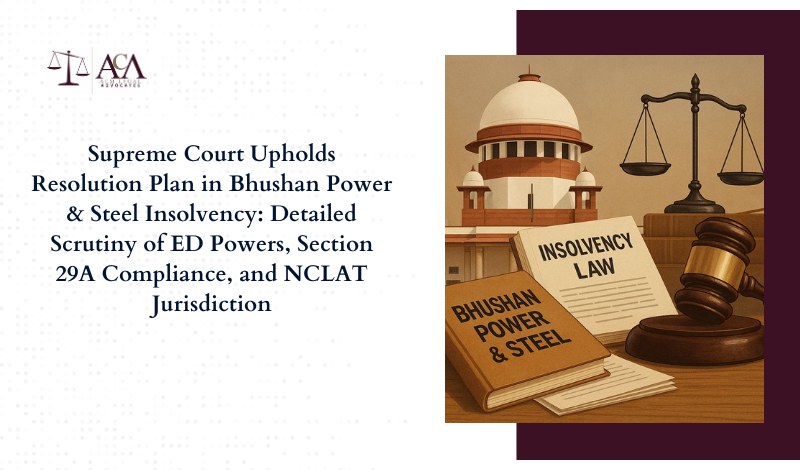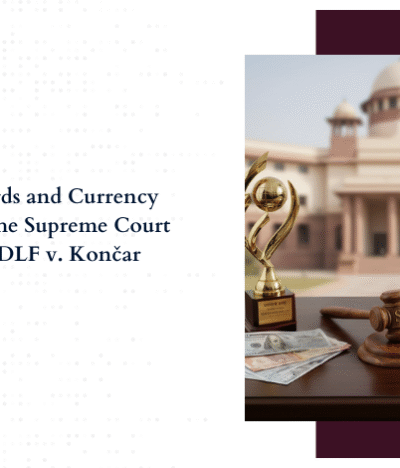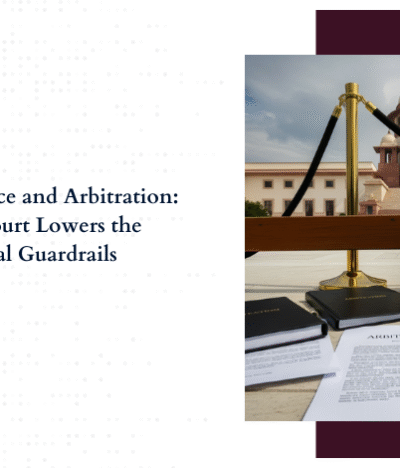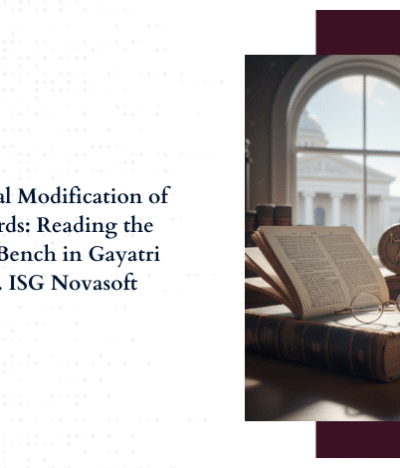Kalyani Transco v. M/s Bhushan Power and Steel Ltd. & Ors.
I. Introduction and Background
In a landmark pronouncement, the Supreme Court of India adjudicated upon a group of civil appeals under Section 62 of the Insolvency and Bankruptcy Code, 2016 (IBC), challenging the judgment dated 17.02.2020 passed by the National Company Law Appellate Tribunal (NCLAT) in connection with the Bhushan Power and Steel insolvency case. The appeals arose from the Corporate Insolvency Resolution Process (CIRP) of M/s Bhushan Power and Steel Ltd. (BPSL), one of India’s largest insolvency matters. The lead matter, Civil Appeal No. 1808 of 2020, was filed by Kalyani Transco, an operational creditor. The other appellants included several stakeholders with claims and objections related to the approved resolution plan.
- Mr. Sanjay Singal and Mrs. Aarti Singal (erstwhile promoters) – Civil Appeals Nos. 2192–2193 of 2020
- Jaldhi Overseas Pte Ltd. – Civil Appeal No. 2225 of 2020
- Medi Carrier Pvt. Ltd. – Civil Appeal No. 3020 of 2020
- CJ Darcl Logistics Ltd. – Civil Appeal No. 6390 of 2021
- Government and State of Odisha – Civil Appeals Nos. 3784 of 2020 and 668 of 2021 respectively
The appellants contested the legality of the NCLAT’s affirmation of a resolution plan submitted by JSW Steel Ltd., which had been approved by the National Company Law Tribunal (NCLT) on 05.09.2019 with conditions.
II. CIRP Timeline and Claims in Bhushan Power and Steel Insolvency
Pursuant to the RBI’s Circular dated 13.06.2017 identifying the so-called “dirty dozen” accounts contributing over 25% of India’s non-performing assets (NPAs), Punjab National Bank initiated CIRP against BPSL by filing Company Petition C.A. (IB) No. 202 (PB)/2017, which was admitted by the NCLT on 26.07.2017. Public notice under Section 15 IBC followed on 28.07.2017.
The Interim Resolution Professional (IRP) admitted claims aggregating to:
- ₹47,204.52 crore from financial creditors; and
- ₹621.37 crore from operational creditors.
The Committee of Creditors (CoC) subsequently confirmed the IRP as Resolution Professional (RP) on 01.09.2017. Resolution plans were invited from eligible applicants. Three prominent PRAs—JSW Steel, Tata Steel, and Liberty House—submitted competing plans. Following an evaluation process pursuant to NCLAT’s directions dated 06.08.2018, JSW Steel’s proposal scored the highest as per the approved matrix. It submitted a consolidated plan on 03.10.2018, amended via an Addendum Letter dated 10.10.2018 to align with Fourth Amendment CIRP Regulations.
The plan was approved by CoC through e-voting on 15–16 October 2018. Accordingly, the RP filed Company Application No. 254 (PB)/2019 under Sections 30(6) and 31(1) IBC seeking NCLT’s approval.
III. NCLT Approval and Conditional Directions
The NCLT, by order dated 05.09.2019, approved JSW’s resolution plan but imposed critical conditions (a) to (k) under Paragraph 128, including:
- Adherence to amended Section 30(2) regarding operational creditor payments;
- Continuation of CoC and RP as Monitoring Agency until closing date;
- Suspension of BPSL’s Board of Directors;
- Necessity to approach statutory authorities for waivers;
- No interference with criminal prosecutions of ex-directors;
- Distribution of CIRP-period profits as per Essar Steel precedent;
- Binding effect of plan on all stakeholders;
- Clarification that adjudicated claims would not be re-agitated.
JSW Steel, aggrieved by certain conditions, especially relating to potential future liabilities, monitoring structure, and plan implementation, preferred Company Appeal (AT)(Insolvency) No. 957 of 2019 before the NCLAT.
IV. Events During Pendency – CBI, ED Actions, and JSW’s Offer
On 05.04.2019, the CBI registered FIR No. RCBD1/2019/E/2002 against BPSL and its directors. Pursuant to this, the Enforcement Directorate (ED) initiated proceedings under the Prevention of Money Laundering Act, 2002 (PMLA) by registering ECIR/DLZO-I/02/2019 on 25.04.2019.
The ED, on 10.10.2019, issued a Provisional Attachment Order (PAO) attaching BPSL’s properties. This action prompted JSW to approach the NCLAT, which granted a stay on the PAO and paused plan implementation.
The CoC, meanwhile, moved the Supreme Court via SLP(C) Nos. 29327–29328 of 2019, which resulted in a stay on ED’s action on 18.12.2019. Simultaneously, JSW filed I.A. No. 47947/2020 seeking relief from plan obligations pending legal clarity. As an interim measure, JSW offered to deposit ₹19,350 crore in an escrow account to protect stakeholder interests while awaiting final adjudication.
V. NCLAT’s Modifications to NCLT Order (Judgment dated 17.02.2020)
The NCLAT substantially modified the NCLT’s approval order. Key interventions included:
- Monitoring Agency: Replaced CoC-RP with a Steering Committee and Monitoring Professional, per JSW’s plan.
- Board of Directors: Clarified suspension was merely to prevent revival of the old board.
- Statutory Liabilities: Held that all liabilities (including interest, penalty, delayed charges) stood settled under the plan.
- Tainted Transactions: Set aside NCLT’s observation allowing future recovery by CoC, holding it contrary to JSW’s Addendum (para 13).
- Profits Earned During CIRP: Directed Monitoring Committee to distribute as per RFP and judicial precedents.
- Undecided Claims: Lifted bar imposed by NCLT under Section 60(6), relying on Essar Steel, asserting that resolution applicants should not face “a hydra head popping up”.
Most controversially, in para 147, the NCLAT declassified BPSL as a promoter of joint ventures like Nova Iron Steel Ltd. without requiring compliance with Companies Act or SEBI procedures—an issue that drew severe scrutiny before the Supreme Court.
VI. Supreme Court on Maintainability of Appeals
JSW and CoC raised objections to the locus of operational creditors and the State of Odisha, asserting:
- They were not “persons aggrieved”;
- Some did not file claims or appear before lower forums;
- They had accepted payments under the plan.
Rejecting these arguments, the Supreme Court ruled that the proceedings under IBC are collective and in rem, and held:
“The use of the phrase ‘any person aggrieved’ indicates that there is no rigid locus requirement… Once the CIRP is initiated, the proceedings are no longer restricted to the individual applicant creditor and the corporate debtor.”
Referring to Glas Trust Company LLC v. Byju Raveendran (2024 SCC OnLine SC 3032), the Court held that the appellants raised substantial questions of law, and their appeals were maintainable.
However, the Court took a contrary view on JSW’s appeal before the NCLAT. Being the successful resolution applicant, JSW was not aggrieved by plan approval. The Court emphasised that Section 61(3) permits appeals only on five limited grounds:
- Contravention of existing laws;
- Material irregularity by RP;
- Discriminatory treatment of operational creditors;
- Inadequate CIRP cost provisions;
- Violation of IBBI criteria.
“None of the grounds stated in Section 61(3) existed… JSW could not be said to be the ‘person aggrieved’ by an order approving its own resolution plan.”
Accordingly, the NCLAT’s entertainment and allowance of JSW’s appeal was held to be ultra vires and without jurisdiction.
VII. NCLAT’s Judicial Overreach and Suppression of Material Facts
The Supreme Court found the NCLAT’s directions in paragraph 147 of its judgment particularly untenable. These directions, which declared BPSL as declassified from the status of a promoter in other group companies such as Nova Iron Steel Ltd., were issued without any pleadings, prayer, or justification under the IBC. The Court held this to be an instance of judicial overreach, observing that the NCLAT had no jurisdiction under Section 61 of the IBC to make such declarations, especially in matters governed by corporate and securities law. This aspect of the appellate order was set aside for being ultra vires.
Another grave concern highlighted by the Supreme Court was JSW Steel’s failure to disclose a 2008 Joint Venture Agreement between itself, BPSL, and Jai Balaji Industries concerning coal block allocation. Though this issue of related party status under Section 29A of the IBC was not pressed in arguments, its non-disclosure was deemed by the Court as highly questionable. The NCLAT’s casual justification of this omission was rejected. The Court noted that the Resolution Professional had failed to comply with Regulation 39(4) of the CIRP Regulations, which requires filing of Form H and certification of the applicant’s eligibility under Section 29A. In this case, the RP neither filed Form H nor verified the affidavit submitted by JSW, undermining the statutory checks embedded in the process. The Supreme Court emphasized that such procedural lapses erode the integrity of the CIRP and cast serious doubt on the resolution applicant’s eligibility.
A critical question addressed was whether the Enforcement Directorate’s attachment of BPSL’s assets under the Prevention of Money Laundering Act, 2002 (PMLA) could be interfered with by the NCLT or NCLAT. The NCLAT had declared the ED’s provisional attachment order dated 10 October 2019 as illegal and lacking jurisdiction, relying on Section 32A of the IBC which grants immunity from prosecution or attachment for prior offences once a new management takes over. The Supreme Court, however, held that neither the NCLT nor the NCLAT has the power to exercise judicial review over administrative actions taken under public law statutes like the PMLA. Referring to the decision in Embassy Property Developments v. State of Karnataka, the Court reiterated that only constitutional courts can adjudicate the validity of such actions.
While related appeals by the CoC and the ED (Civil Appeals 14503–14504 of 2024 and Civil Appeal 3362 of 2020 respectively) were disposed of by a consensual order on 11 December 2024 allowing JSW to take over the attached assets, the Court made it clear that it was not deciding the interpretation of Section 32A or the legality of the ED’s action. The issue of whether Section 32A applies retrospectively to protect corporate assets from prior criminal liabilities thus remains unresolved in law.
Ultimately, the Supreme Court partly allowed the appeals filed by Kalyani Transco and other creditors. It quashed the NCLAT’s judgment in so far as it allowed JSW’s appeal and modified the NCLT’s order. It restored the NCLT’s conditional approval of the resolution plan dated 5 September 2019 in full, and held that JSW’s appeal before the NCLAT was not maintainable under Section 61(3) of the IBC. The Court permitted the implementation of JSW’s resolution plan, including the deposit of ₹19,350 crore in escrow, subject to compliance with applicable law and without prejudice to pending investigations. The conduct of the Resolution Professional was strongly deprecated, particularly for his failure to verify Section 29A eligibility and file the mandatory compliance certificat
Conclusion
In conclusion, this judgment clarifies the contours of jurisdiction under the IBC and reinforces that commercial outcomes in resolution proceedings must strictly adhere to statutory requirements. It affirms that the role of adjudicating authorities is confined to the scope defined under the IBC, and that overreach into matters governed by other statutes such as the PMLA is impermissible. By restoring the original order of the NCLT and nullifying the NCLAT’s unwarranted modifications, the Supreme Court has upheld both the sanctity of the resolution process and the procedural discipline essential to its credibility.






